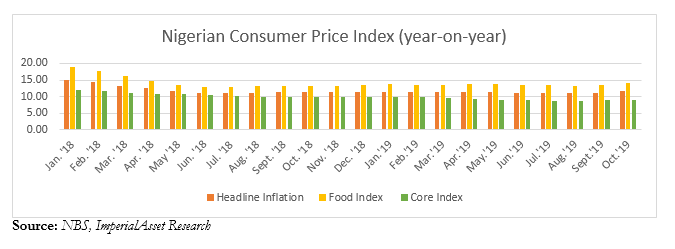By Imperial Assets Research
HeadlineCPI Note
The National Bureau of Statistics (NBS) on Monday, 18November2019published the Consumer Price Index (CPI)data for October 2019 – which measures inflation in Nigeria. An overview of the report showed that inflation rose modestly to 11.61%year-on-year (y/y) in October against September’s record (11.24%), indicating 37basis points (bps) upward pressure on goods and services. For the first time since May, negative pressure on goods and services helped to move month-on-month (m/m) inflation northward the second time in a row. Retrospectively, the current inflation rate is now at a 17-month high.
Similarly, on a month-on-month basis, the headline inflation index roseby1.07%, representing 3bps above September’s record of 1.04%. Further scrutiny of the data showed that all the 14 components that made up the CPI grew relative to September’s figures, on a m/m basis, with heightened pressure seen on the food item categories (imported food and domestic produced food).
The food inflation index was reported at 14.09%, representing 58bpsover September’s figure. The rise in the food indicator feed on upward pressure in the prices of the following items – cereals such as rice; oils & fats such as cheese, butter, and vegetable oil; meat such as poultry; fish; tubers such as yam; and potatoes. However, core inflation which excludes the prices of volatile agricultural produce, eased to 8.88%, representing 7bps lower than 8.94% reported in September. Note that the current food inflation is at its 18-month high last seen in April 2018.
Borders’ closure – a negative pressure to food items
As we hinted in September’s Inflation Review and Outlook, the uptick in the October’s inflation was significantly impacted by the FG directive to Custom to close all Nigeria land borders to neighbouring countries – a measure adopted to arrest uncontrolled smuggling and importation of unlicensed produces/products into the country. Notwithstanding the merits of the measure, it created a dire pressure on food items in October and most affected food items were rice and poultry products (frozen chicken and turkey) which prices surged by 31.2% and 6.32% respectively between August and September (sourced from NBS data on Selected Food Prices in September). Surprisingly, the Core Inflation Index which we expected to spike upward in October since most imported products are routed into the country through the land borders contracted in the month, thanks to relative stability in the energy prices which muted pressure on the FX.
Implications of the Borders’ Closure on Inflation going forward
The boarders’ closure as earlier noted is a corrective measure adopted by the government to critically address the smuggling of unregulated products into the country and to ensure that Nigeria does not become a dumping ground for unwanted (unstandardized) products. Obviously, the government’s intentions are well thought out. There is no better time to implement any policy that has mid-to-long term benefits than now. The short-term challenges notwithstanding – such as the uptick in inflation index, which may linger for additional months, the benefits are surfacing already. According to Rice Farmers Association of Nigeria (RFAN), local rice production is being ramped up in order to meet the demand gap created by border closure. Federal Ministry of Agriculture and Rural Development (FMARD), Nigeria annual rice consumption was estimated at about 7million metric tons (MT) between 2018/2019, local production was put at 4.78million MT. Unverified data from RFAN, showed that production has ramped up to 5.1million MT ever since the border closure was effected, reducing the demand gap from 2.22million MT to 1.9million MT. Hearsay in the market place has it that the price of refined local rice (integrated) produce has eased by 17.9% to N19,500 per 50kg. The same story goes for poultry and tomato produces. The government needs to sustain the effort made thus far until such a time when prices of local brands become competitive to imported brands. It is only a matter of time – prices will find its equilibrium.
MPC likely to maintain Status Quo in November meeting
The Monetary Policy Committee of the CBN will hold its last meeting of the year next week Monday and Tuesday. Outside the current inflation pressure, the dwindling foreign reserves account and the low yields environment will be burning issues to the MPC. In the global space, unresolvedUS-China trade conflicts and increasing accommodative policy stance by advanced economies’monetary authorities will undoubtedly fickle the mind of MPC on whether to hold, increase or reduce rates. However, we are of the view the MPC will keep policy rates amid relative FX stability and in order to complement the moral suasion efforts at increasing credit to the economy thereby boosting productivity.
Inflation Outlook for November 2019
We expect negative pressure on the headline inflation rate to be elevated in November 2019 notwithstanding the glowing harvest season for food items. The impact of the total closure of the borders will, once again, be elevated. Money supply will be pressured due to recently released of ₦600 billion for capital spending in the last quarter of the year. The expected implementation of minimum wage across the states, and VAT increase will equally be a negative pressure to the inflation reading. Overall, we estimate that m/m and y/y headline inflation will increase by 5bps and 7bps to 1.12% and 11.68%respectively in November buoyed by the above headwinds.








